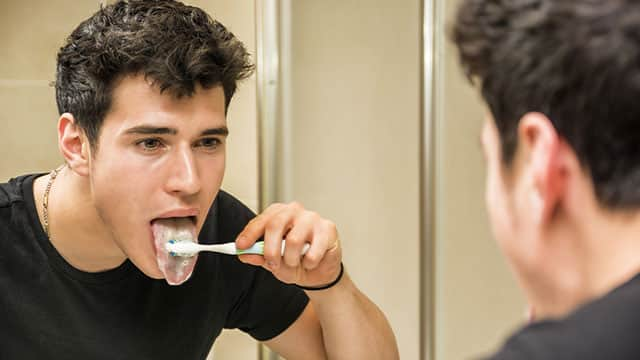Causes
Black hairy tongue is caused by overgrowth on the surface of the tongue called hyperkeratosis. The tiny bumps on the surface of your tongue, known as the papillae, contain the same protein that's responsible for the hair on your head. A black and hairy tongue occurs when there's little to no stimulation on the top of your tongue. As a result, the papillae don't shed and can grow to appear hair-like.
These "hairs" can trap food, bacteria, and yeast, creating black, brown, or white discoloration on your tongue. Types of mouthwash, antibiotic treatments, and radiation therapy can also lead to a hairy tongue. Check with your dentist to discuss the best mouthwash and medical treatments for you, considering your health history and the potential side effects.
Risk Factors
If you have a black hairy tongue, there's no need to panic. The condition is relatively common and may affect up to 13 percent of the population. Individuals of any age can develop it, according to the National Institutes of Health (NIH). However, the likelihood increases as you age and is more commonly seen in males than in females.
Certain lifestyle factors can also trigger this overgrowth on the tongue. According to a review in the World Journal of Gastroenterology, if you use tobacco or drink alcohol, black tea, or coffee excessively, you have a higher risk of developing it. Poor oral hygiene is also a significant risk factor. Individuals who eat a soft diet may develop the condition because soft foods do not aid in papillae shedding.
Diagnosis
Your doctor or dentist can diagnose hyperkeratosis on the tongue visually. They will review your medical history to rule out other possible causes, such as infections, oral lesions, and medications and foods that have stained the tongue. It is important to tell your medical or dental professional about all medications you are currently taking to determine if these medications may affect your tongue. You will likely not have any symptoms to report, as the condition is painless, but some people may experience gagging or bad breath.
Treatment and Prevention
A black and hairy tongue isn't ultimately harmful to your overall health. It's generally easy to treat both the condition and any secondary cause. You should be able to clean the surface of your tongue using a soft toothbrush or a tongue scraper. In severe instances, your doctor or dentist may prescribe medications or recommend an antiseptic mouthrinse, notes the NIH. If this hasn't worked to eliminate black hairy tongue, your dentist may consider using laser surgery or electrical current as the final treatment options.
The best prevention method is to commit to good, daily oral care and reassess your habits. Along with brushing twice daily and cleaning between your teeth, you might consider using a tongue scraper to clean your tongue. Refraining from tobacco use and limiting your alcohol, black tea, and coffee intake may also help. With a good oral care plan in place that includes regular dental visits, you can keep all the parts of your mouth healthy.
Oral Care Center articles are reviewed by an oral health medical professional. This information is for educational purposes only. This content is not intended to be a substitute for professional medical advice, diagnosis or treatment. Always seek the advice of your dentist, physician or other qualified healthcare provider.
ORAL HEALTH QUIZ
What's behind your smile?
Take our Oral Health assessment to get the most from your oral care routine
ORAL HEALTH QUIZ
What's behind your smile?
Take our Oral Health assessment to get the most from your oral care routine
Oral Care Center articles are reviewed by an oral health medical professional. This information is for educational purposes only. This content is not intended to be a substitute for professional medical advice, diagnosis or treatment. Always seek the advice of your dentist, physician or other qualified healthcare provider.














